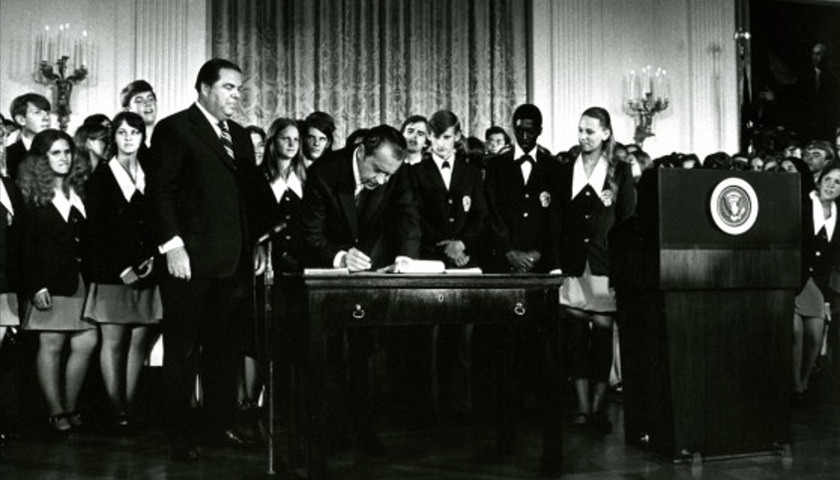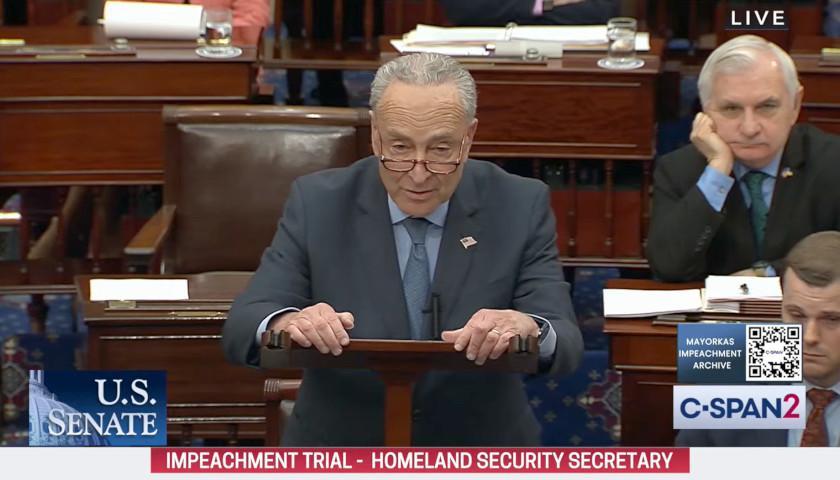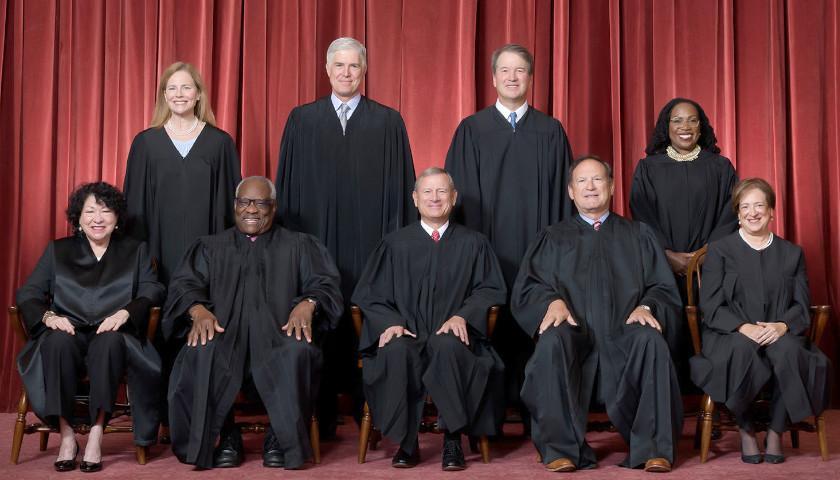Back in 1971, the Tennessee General Assembly quickly ratified the 26th Amendment to the Constitution of the United States, which lowered the voting age in all elections–federal, state and local– to 18 in every state. By doing so, they voluntarily give up a section of the Tennessee State Constitution.
Here’s that story:
During the late 1960s and early 1970s, the Vietnam War — with which the United States was heavily involved — continued to rage overseas. With so many American soldiers — several of them younger than 20 years of age — dying on the battlefields of a foreign land in this War, public opinion within the United States began to shift in terms of by what age a person should become eligible to vote. At the time, an individual had to be at least 21 years of age in order to register to vote.
But with the evolution in social sentiment occasioned at least in part by the Vietnam War, Congress began to take steps to lower that age from 21 down to 18. A popular slogan of the day was “if you are old enough to fight for your country, then you are old enough to cast a vote.”
On June 22, 1970, President Richard Nixon signed the bill H.R. 4249 into law, extending the Voting Rights Act of 1965. Contained within that extension of the 5-year-old federal law was new additional language requiring a lowering of the voting age nationwide to 18 in all federal, state and local elections (Public Law No. 91-285).
A challenge to this supplementary provision of the Act was forthwith filed in the federal court system. The case was “fast-tracked” up to the U.S. Supreme Court where the Justices heard arguments on October 20, 1970. A couple of months thereafter, on December 21, 1970, the 9-member High Court issued its 5-4 decision in Oregon v. Mitchell in which it was ruled that while Congress indeed had authority — by mere statute — to set age requirements for voting in federal elections, nevertheless it lacked the ability to fix such standards for state or local elections.
Quick to respond, the recently-installed 92nd Congress took up and considered Senate Joint Resolution 7, proposing an amendment to the U.S. Constitution, per its Article V, that would establish, on a uniform basis, that persons aged 18 or older may vote in all federal, state and local elections. The U.S. Senate adopted S.J. Res. 7 on March 10, 1971, with a resounding 94 yeas, 0 nays, and 6 “not voting”. Later that month, on March 23, 1971, the U.S. House of Representatives thundered its approval with 401 yeas, 19 nays, and 12 “not voting”. And, with that, the measure immediately became pending business before America’s state lawmakers.
With dizzying swiftness, the state legislatures began ratifying this proposed federal constitutional amendment. Indeed, state lawmakers in Connecticut, Delaware, Minnesota, Tennessee and Washington approved it posthaste on the very same day that the U.S. House of Representatives had completed action upon S.J. Res. 7 in the nation’s capital.
And with further head-spinning dispatch, the verbatim text of the 87th Tennessee General Assembly’s House Joint Resolution No. 1 burrowed its way into the U.S. Senate’s portion of the Congressional Record of March 29, 1971 — less than a full week after Tennessee lawmakers adopted the resolution at the State Capitol in Nashville.
Tennessee’s same-day approval of the proposition was, though, in clear disregard for Article II, Section 32, of the Tennessee State Constitution, which necessitated the intervention of an election — and the seating of a subsequent General Assembly — to consider any federal constitutional amendment proposed by Congress.
Article II, Section 32 declared:
“No…General Assembly of this State shall act upon any amendment of the Constitution of the United States proposed by Congress to the several states; unless such…General Assembly shall have been elected after such amendment is submitted.”
On July 1, 1971, with its adoption by North Carolina legislators, the proposed amendment had speedily received its 38th ratification (three-fourths of the 50 states) sufficient to propel it into the U.S. Constitution as that document’s 26th Amendment. The 26th Amendment remains to this day the one ratified by the state legislatures in the shortest amount of time.
However, not everyone in Tennessee was pleased with such a brisk pace.
A lawsuit was filed within the state — not the federal — court system in an attempt to assail the Tennessee General Assembly’s instantaneous March 23, 1971, ratification of the measure on the grounds that such rapid action on the part of Tennessee state lawmakers was in violation of Article II, Section 32, of the Tennessee Constitution.
Had Tennessee lawmakers adhered to Article II, Section, 32, they would have had to wait until the November 1972 election — and the January 1973 commencement of a freshly-sworn 88th General Assembly — before they could take any action upon this proposed federal constitutional amendment, the theory being that their constituents would have ample opportunity to express support of, or opposition to, the concept before state legislators would cast any votes.
Working its way up to the Tennessee Supreme Court, that tribunal ruled, in the case of Walker v. Dunn, on September 5, 1972, that the timing dictations contained within the above-quoted Article II, Section 32 of the Tennessee Constitution were actually in violation of the process outlined in Article V of the U.S. Constitution, as well as in violation of Article VI, the federal Constitution’s “supremacy clause”. State statutes or state constitutions — various courts have ruled — may not establish state legislative procedures more stringent than what the federal Constitution prescribes for state legislative consideration of proposed federal constitutional amendments.
When a state legislature weighs the pros and cons of a proposed federal constitutional amendment — and casts votes upon such a proposal — it is deemed to be performing a federal function, and therefore, it is not bound by further restrictions sought to be imposed within the framework of state law.
Legislators in any state could, of course, restrain themselves by voluntarily deferring action upon a proposed federal constitutional amendment until citizens of that state have had adequate opportunity to make their views known to their state lawmakers.
After the dust had settled, the Tennessee General Assembly’s March 23, 1971, accelerated adoption of what only months later became the U.S. Constitution’s 26th Amendment was left intact — and Article II, Section 32 of the Tennessee Constitution fell by the wayside, a casualty of having been rendered null and void, not by a federal court, but indeed, by a state court.
– – –
With his decade of work (1982-1992) to gain the 27th Amendment’s incorporation into the U.S. Constitution, Gregory Watson of Texas is an internationally-recognized authority on the process by which the federal Constitution is amended.









I would like to respond to this. Do you have a problem with lowering the voting age to 18. That amendment enabled me to vote before I turned 21 in Nashville’s mayorial runoff between Briley, Sr. and Jenkins. I felt like a full American full filling his or her civic duty.
If we were old enough to be drafted in some stupid war like both the Vietnam and Korean conflicts, we certainly were old enough to vote the war mongers out of office.
If you attack Tennessee for being among the first of the U.S. states for supporting the 1971 Amendment to lower the voting age, then you will have to pounce on the Deep South state of Georgia which, in 1945, became the very first state in the Union to lower its voting age to 18. Governor Ellis Arnall was outraged that hawkish conservatives of both sexes who managed to sit out the war would sanctimoniously oppose the right of combat soldiers to vote. He very astutely had some wounded veterans sit in the gallery of the Legislature to shame Georgia’s lawmakers into doing the right thing.
I guard my voting rights jealously.
Bill Delzell
[email protected]
You have misinterpreted the article, Mr. Delzell. The article expresses neither opposition to, nor support of, the 26th Amendment.
The article merely points out that once-upon-a-time, there had been a provision of the Tennessee State Constitution seeking to prevent hyper-quick action on the part of Tennessee State lawmakers when it came to formally considering action upon a Federal Constitutional Amendment proposed to the state legislatures by Congress.
The same 87th Tennessee General Assembly which rapidly ratified the 26th Amendment in 1971 likewise ratified the proposed Equal Rights Amendment (ERA) in 1972–only to later regret such fast movement on ERA.
In 1974, the succeeding 88th Tennessee General Assembly–in seeking to rescind Tennessee’s 1972 ratification of the ERA–characterized the action of the prior 87th General Assembly as “…taken rather hastily, without thorough discussion and hearings thereon and since then grave doubts have arisen in the minds of many legislators about the wisdom of our action in rushing to ratify the proposed [Equal Rights] amendment…”. (Tennessee Senate Joint Resolution No. 29, adopted April 23, 1974).
Perhaps acting hurriedly, and casting aside normal features of the legislative process such as public hearings in committees, is not always advisable.